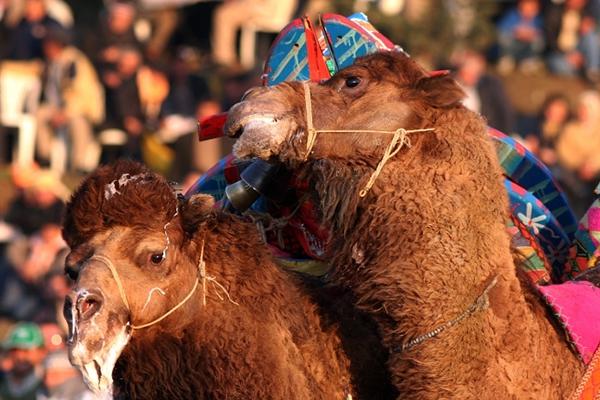Traditions - Camel Fighting

In Turkey, camel wrestling is one of the country's oldest traditions and is an event that is gaining in popularity with tourists every year. The event not only consists of the camel fight, but the celebration brings together thousands of people in a festive atmosphere to eat and drink typical products. This factor is making this activity a popular option for certain tourists, attracted by the folklore of the celebration.
However, these fights are strongly criticized by different animal defense organizations that report not only their cruelty, but also their illegal character within the Turkish Animal Protection Laws and punished by their Penal Code.
Since 1982, the Selcuk Efes Camel Wrestling Festival has been one of the best known festivals, attended by 20,000 people and a growing number of tourists. More than 140 camels are used in the fights, which last approximately five minutes. Even so, there are dozens of such fights which, understood as a sport, are organized as a league.
The abuse of camels
To ensure aggressiveness in these animals, the fighting season coincides with the three winter months in which the females are in heat, which consequently causes the alteration of these animals.
Even before they start, it is common to see camels drooling due to stress. They are also usually kept fasting or in a state of hunger during the months prior to the event, so that they get easily irritated.
The camels try to tilt the other's head and keep it on the ground by pushing with their own neck, sometimes even jumping with all their weight on their opponent's head. They also push themselves by trying to trip themselves up by sticking their neck between their opponent's legs or forcing them to sit on the ground. Owners often beat the animals with sticks to secure the lunges. The animal that does not panic, run away, scream or fall to the ground is proclaimed the winner and is usually sold for a large amount of money.
Those responsible for the event claim that it is not a cruel event since the camels have their mouths covered precisely so that they cannot bite each other and that the referees have to stop the fight in case the performance becomes too violent.
However, forcing animals to fight away from their natural context (as indicated, in many cases, a female in heat is used before starting the fight, walking her in front of the males to ensure aggressive behavior) and using them in these mass gatherings, organized as sports leagues, do not allow us to speak in any case of practices that are free of animal cruelty.
